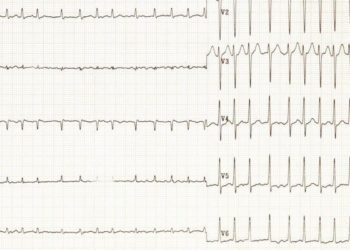Open-source automated insulin delivery is effective in management of type 1 diabetes
1. Using an open-source automated insulin delivery (AID) system significantly increased the percentage of time in the target glucose range in type 1 diabetes patients.
2. Using an open-source AID system resulted in no events of severe hypoglycemia or diabetic ketoacidosis during the study period.
Evidence Rating Level: 1 (Excellent)
Study Rundown: AID systems have been used and shown to improve glycemia control and reduce the care burden for patients with type 1 diabetes. AID systems encompass an insulin-delivery algorithm, insulin pump, and continuous glucose monitoring. Multiple open-source AID systems have evolved and many patients have been using these systems worldwide. The uptake of open-source AID systems has a number of barriers that include lack of regulatory approval, lack of trial data regarding safety and efficacy, limited expertise among healthcare providers, and a perception that use is technically difficult. Therefore, there remains a gap in knowledge about the efficacy and safety of open-source AID systems compared to sensor-augmented insulin pump therapy in patients with type 1 diabetes. Overall, this study found that using an open-source AID system led to a significantly higher percentage of time spent in the target glucose range than using a sensor-augmented insulin pump at 24 weeks. This study was limited by the enrollment of patients with a relatively low glycated hemoglobin level at baseline, and the underrepresentation of patients with reduced economic resources. Nevertheless, these study’s findings are significant, as they demonstrate that the utilization of an open-source AID system resulted in a significantly higher percentage of time spent in the target glucose range with no significant adverse effects.
Click to read the study in NEJM
Relevant Reading: Randomized Trial of Closed-Loop Control in Very Young Children with Type 1 Diabetes
In-Depth [randomized control trial]: This multicenter, open-label, randomized control trial randomly assigned patients (n=97; 48 children, 49 adults) with type 1 diabetes in a 1:1 ratio to use an open-source AID system or a sensor-augmented insulin pump (control group). Patients between the ages of seven and 70 who had received a diagnosis of type 1 diabetes at least 1 year earlier, had at least 6 months of experience with insulin pump therapy, and had a mean glycated hemoglobin level of less than 10.5% were eligible for the study. Patients who did not fit these inclusion criteria were excluded from the study. The primary outcome measured was the percentage of time in the target glucose range of 70 to 180 mg per deciliter between days 155 and 168. Outcomes in the primary analysis were assessed via a linear regression model with independent variables including stratification variables and dependent variables measured at baseline. Based on the primary analysis, at 24 weeks, the mean time in the target range increased from 61.2% to 71.2% in the AID group and decreased from 57.7% to 54.5% in the control group (Adjusted Difference, 14%; 95% Confidence Interval, 9.2 to 18.8). Additionally, patients in the AID group spent three hours and 21 minutes longer in the target range per day than those in the control group. No severe adverse events such as severe hypoglycemia or diabetic ketoacidosis occurred in either treatment group. In summary, this study demonstrates that using an open-source AID system resulted in a significantly higher percentage of time spent in the target glucose range than using a sensor-augmented insulin pump for patients with type 1 diabetes.
Image: PD
©2022 2 Minute Medicine, Inc. All rights reserved. No works may be reproduced without expressed written consent from 2 Minute Medicine, Inc. Inquire about licensing here. No article should be construed as medical advice and is not intended as such by the authors or by 2 Minute Medicine, Inc.







